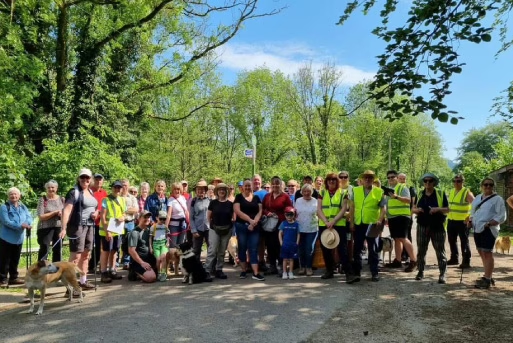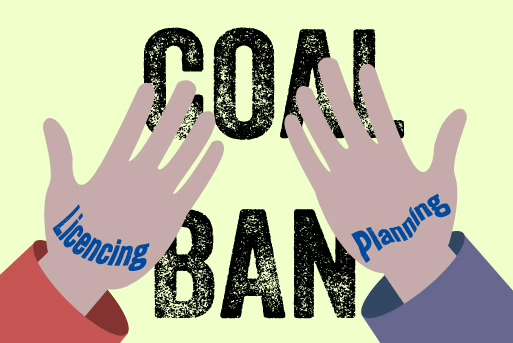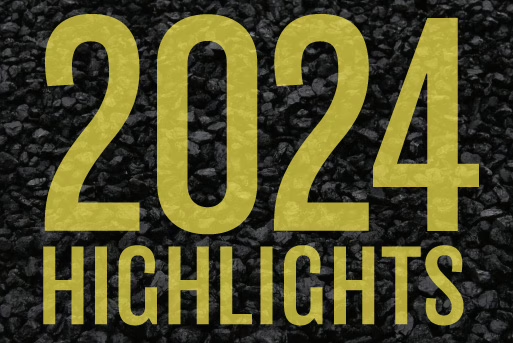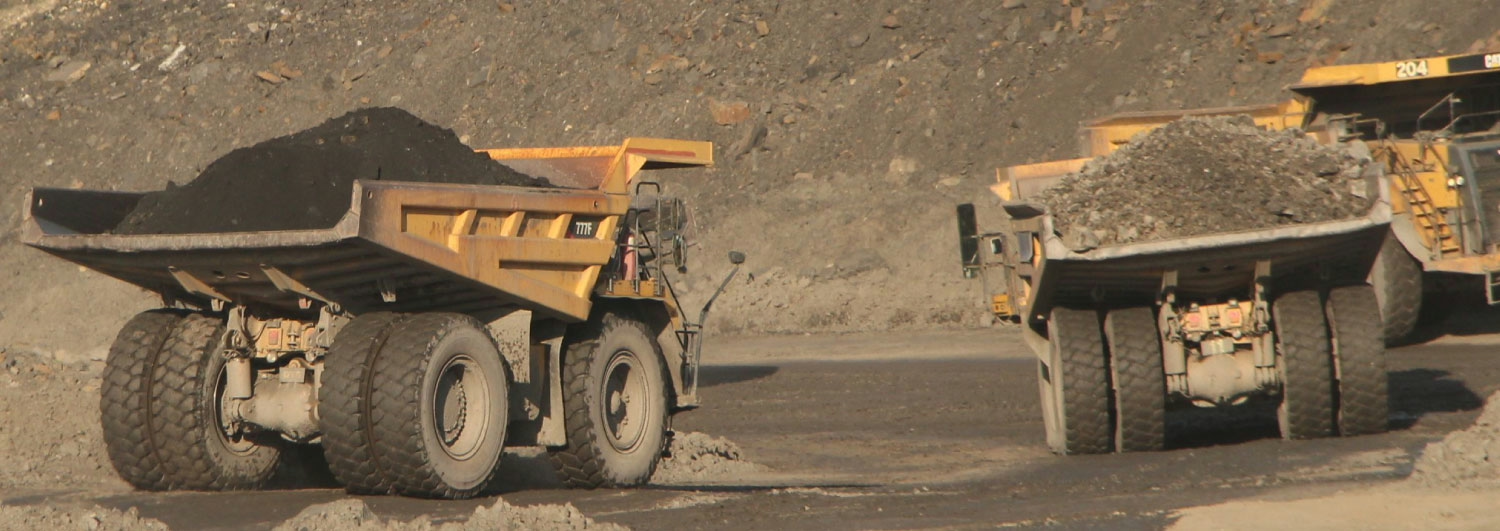
Supporters of Sirhowy Valley Country Park are people of the local area in Caerphilly who have come together to oppose the proposal to mine two disused coal tips north of the town of Bedwas, threatening the adjacent Sirhowy Valley Country Park . This proposal would see the extraction and sale of 400,000 tonnes of coal that was left behind as waste within the two coal tips. The third coal tip, closest to the town of Bedwas would be untouched.

The UK Government launched a consultation on a limited review of the National Planning Policy Framework (NPPF) for 8 weeks from 30 July to 24 September 2024. The NPPF is an influential document that shapes planning decisions and priorities across England. It is periodically updated by the Government, following a public consultation. Although this consultation was focused on just sections of the NPPF relating to house-building and economic infrastructure, we felt this was a good opportunity to align the NPPF with the stated policy of the current UK Government not to licence any new coal mines.
The UK Government has committed not to licence any new coal mines - a function of the Mining Remediation Authority (previously, The Coal Authority). However, licencing may not apply to all types of coal mining so it is important to also prevent planning permission from being given to any new coal mining applications in a 'double lock' approach. We therefore recommended that the following changes to the NPPF -
The following text should be removed entirely:
221. c) indicate any areas where coal extraction and the disposal of colliery spoil may be acceptable;
221. d) encourage the capture and use of methane from coal mines in active and abandoned coalfield areas;
221. e) provide for coal producers to extract separately, and if necessary stockpile, fireclay so that it remains available for use.
and:
223. Planning permission should not be granted for the extraction of coal unless:
223. a) the proposal is environmentally acceptable, or can be made so by planning conditions or obligations; or
223. b) if it is not environmentally acceptable, then it provides national, local or community benefits which clearly outweigh its likely impacts (taking all relevant matters into account, including any residual environment
should be replaced by:
223. Planning permission should not be granted for the extraction of coal.
In an e-action we organised, 2,130 supporters and member of the public contributed to the NPPF consultation to demand planning permission for new coal mining is ruled out. A little concerningly though, the Ministry of Housing, Communities & Local Government only counted 1,867 emails calling for this. Even at 1,867 emails, that means, of the 10,981 emails in total that the consultation received, 17% - or almost 1 in 5 - was a demand to rule out planning permission for new coal mines.
The overwhelming consultation response for the UK Government to implement its stated position against new coal mines in the NPPF presented an early opportunity for joined-up policy-making by the new Government between the Ministry of Housing, Communities & Local Government and Department for Energy Security and Net Zero. Without this 'double lock', coal mining companies could still apply for - and obtain - planning permission for new coal mining. Theoretically, a standard coal mine still wouldn't be able to proceed because it's unable to obtain the licence, which it needs in addition to planning permission - but which the UK Government has said it would refuse.
HOWEVER, if the coal to be mined is not from a virgin coal seam (see mining coal tips), the project does not require a licence in addition to planning permission. There is well over 600 million tonnes of coal that this applies to across the UK. That's exactly why planning permission, as well as licences, needs to be categorically ruled out for new coal mining projects. Due to their complex nature, processing new coal mining applications also creates a large burden on over-stretched local planning authorities. The current wording of the NPPF creates an ambiguous and complicated assessment process for local planning authorities which our proposed wording would have simplified.
In this case of the left hand not speaking to the right hand, we hope the UK Government recognises the value of working more closely with non-governmental and civil society organisations seeking to support its stated policy aims.
In its environmental statement, Bryn Bach Coal Ltd attempts to present the anthracite coal it wishes to extract from an expansion of Glan Lash as a unique and scarce commodity that is needed for water filtration, bricks, and graphite, and would therefore be too valuable to burn. Yet, visiting Energybuild Ltd’s website will demonstrate that anthracite coal is currently being produced in large quantities at Aberpergwm. It is this coal that Bryn Bach Coal Ltd currently washes and sells to both burn and non-burn customers. This proves that Glan Lash anthracite coal is not unique or scarce, and just because it is of a carbon-content suitable for water filtration does not prevent it being also sold for combustion. Indeed, anthracite coal from Aberpergwm is also currently sold to heat greenhouses in the Netherlands to grow tomatoes into the cold season, according to Energybuild Ltd’s website.
For example, the three local water filtration companies that Bryn Bach Coal Ltd refer to are listed as customers on Energybuild Ltd’s website, along with Ibstock Ltd, the brick manufacturer, which Bryn Bach Coal Ltd claim would buy its Glan Lash coal. Therefore, coal supplied to any of these customers from Glan Lash would compete with coal from Aberpergwm, which could instead be supplied to combustible uses (as the High Court has confirmed that the displacement argument with coal are fallacious as coal is simply sold to different markets). It is also unlikely that separation would be maintained between anthracite coal from Glan Lash and anthracite coal from Aberpergwm, rendering record-keeping on respective customers a fiction.
In light of the local demand for our anthracite and letters of intent for supply we are able to ensure that 100% non-thermal-non/fossil fuel use will be achieved should planning permission be granted. This can be monitored by submission of yearly declarations from our customers stating tonnages purchased and its end use. It would not make economic sense for Bryn Bach Coal Ltd to change market strategy as poorer quality cheaper anthracites can be used as a fossil fuel. It can therefore be stated that this is not a fossil fuel application as the anthracite will not be used as an energy source this is an application to mine a mineral. P23
“Letters of intent for supply” can be binding or non-binding. As Bryn Bach Coal fails to specify which it has, we must assume it is “a non-binding letter of comfort” which “are merely expressions of hope” – ERDC Group v Brunel University [2006] EWHC 687 (TCC) – HH Humphrey Lloyd QC at para [27]. We understand that, without planning permission, Bryn Bach Coal Ltd may be unable to obtain binding letters of intent or contracts, but the fact remains, that its so-called ‘letters of intent’ therefore amounts to nothing more than pillow talk.
Bryn Bach Coal Ltd will know that there’d be no consequences for its planning permission if it supplies Glan Lash coal to its existing customers for home heating and other combustion uses. Section 106 agreements cannot control or monitor customers or customers’ use of the coal. Bryn Bach Coal Ltd also cannot predict the market volatility over the next 6-7 years affecting its various customers, and their demand for anthracite coal. Just as Bryn Bach Coal Ltd currently supplies anthracite coal to fossil fuel customers, it is likely to do so again with Glan Lash coal should the market conditions make it favourable to do so.
This exception has been accomplished firstly as Bryn Bach Coal Limited being the largest supplier of anthracite to the British brick manufacturing industry. Between 0.5-1.0% anthracite is used in the clay mix within each brick to react with the clay and add colour & carbon should the clay require additional carbon. This use as a brick colourant means the anthracite is not burnt and therefore does not release CO2 into the atmosphere... Ibstock Brick PLC is a long-standing customer and we have been supplying anthracite since 2005. A letter of support has been included and it must be noted that with the UK Government pledging to build 1.5 million new homes demand for bricks will undeniably increase. P24
Ibstock’s kilns fire bricks at heats exceeding 1,000c – and Energybuild Ltd, which operates Aberpergwm coal mine, confirms “The coal does combust…”, so the EIA’s claim that the anthracite is not burned or released CO2 appears to be ostensibly false, again throwing into question the credibility of other claims around the proposed consumption of coal from the Glan Lash expansion. Our research also suggests that anthracite is not required to “react with the clay”, and therefore invite Bryn Bach Coal Ltd to reference their claim. Furthermore, it may be that there are suitable alternatives to anthracite as a brick colourant, given the range of minerals used to currently produce different colours; “the body colour is largely dependent on the clay type, however, variation can also be achieved through methods such as body staining, surface sanding, staining or altering firing conditions” – Brick Development Association, 2023. The necessity of anthracite coal for British brick production is far from clear so should not be a material planning consideration until Bryn Bach Coal Ltd is able to substantiate its claims with accurate references, as we have.
Secondly Bryn Bach Coal Limited is a supplier to the water filtration industry where the anthracite is used as a filter medium in the water industry, the anthracite from the original Glan Lash site supplied three local Ammanford based Filter Media businesses. The anthracite is used in filter beds to purify drinking water, in de-salination plants and in sewage beds. Again, the anthracite use is non-thermal and does not release CO2 into the atmosphere. There are 3 Ammanford based filter media manufacturers and jointly employ over 100 people. The 3 filter media manufactures are long standing customers and with Celtic Energy having ceased operations there is a desperate shortage of premium quality anthracite. Letters of support annexed to this report. P24
These three filtration companies are currently being supplied by the large Aberpergwm deep coal mine which has permission to mine 40 million tonnes more anthracite until 2039 and which describes its own coal as a “source of high-grade anthracite” – again proving false the claim that “there is a desperate shortage of premium quality anthracite”. The reference to Celtic Energy is even stranger, since the four mines operated by Celtic Energy produced largely thermal coal, not anthracite. We respectfully suggest that this whole section of the EIA (as amended in Nov 2024) is revisited by Bryn Bach Coal Limited.
Even if the coal is not burned, the mining of coal releases methane into the atmosphere with a far higher climate change intensity than CO2. According to Veolia, industrial water treatment contractor, “quartz sand, silica sand, anthracite coal, garnet, magnetite, and other materials may be used as filtration media. Silica sand and anthracite are the most commonly used types.”. The existence of alternatives to anthracite clearly exist and should be encouraged, given the methane dimension of anthracite and propensity for it to also be sold for combustion, once mined – just as Aberpergwm anthracite coal is currently. Maintaining and increasing the supply of anthracite coal ‘locks in’ the water filtration industry to rely on anthracite rather than invest in improving its less harmful alternatives.
“Developing markets for non-thermal-non fossil fuel uses are emerging especially using anthracite as a substitute for graphite which is a critical mineral essential to achieve Net Zero by 2050 (Glan Lash anthracite has 92% fixed carbon, natural graphite has 100% fixed carbon). The demand for graphite will increase from the current 1.6m tonnes per year to 8m tonnes per year if we are to achieve Net Zero by 2050 (World Bank 2020). The International Energy Agency estimates a 400% increase in graphite production will be required by 2040.”
Again, Bryn Bach Coal Ltd’s claims of non-thermal are misleading. Anthracite wouldn’t be used to fuel graphite heating as a fossil-fuel, but it certainly would be heated to extreme temperatures of 1,000c for ‘baking’ and up to 4,000c for ‘calcination’ to remove impurities making up 8% of the anthracite and stabilise the graphite end product. This would release greenhouse gasses in a similar way to if it were burned for household heating – there is little to distinguish between the two end uses in terms of climate change impact.
It should also be clarified that Anthracite wouldn’t be a substitute for graphite as such, it would be used to manufacture synthetic graphite – being one of several suitable carbon-heavy materials). But natural graphite and scrap graphite can also be used. Furthermore, the UK doesn’t manufacture any graphite – therefore, the anthracite used for this purpose would be exported abroad, undermining further Bryn Bach Coal Ltd’s arguments around saved travel emissions. Demand in the UK is also relatively low “UK is a small net importer of natural and synthetic graphite”.
“The importance of Anthracite has been highlighted in the European Union’s publication Sustainable EAF Steel Production and describes how Anthracite will still be required after this transition and how it will play a vital role as a foaming agent and a carrier of carbon in this type of Steel Production process. Tata Steel at Port Talbot will require Anthracite when the Electric Arc Furnaces start producing steel.”
Bryn Bach Coal Ltd’s EIA statement neglects to mention that the study it refers to is over a decade old (2013)…and concludes the very opposite of what this Bryn Bach Coal Ltd purports it to: “The results obtained have demonstrated the technical feasibility of the approaches used while the economical evaluation has showed the sustainability of replacing the coal with char from biomass, in addition to environmental benefits due to CO 2 reduction, even if at the moment there is not a real assessed market of charcoal for steelmaking purposes” - European Commission: Directorate-General for Research and Innovation, Echterhof, T., Baracchini, G., Pfeifer, H., Griessacher, T. et al., Sustainable EAF steel production (GREENEAF), Publications Office, 2013, https://data.europa.eu/doi/10.2777/44502.
A more recent follow-up study commissioned by the EU from the same authors reinforces the 2013 report findings “Industrial trials of EAF charging confirmed the feasibility of coal substitution and outlined the relevant process aspects.” And “The best slag foaming, comparable with the pulverised fossil coal injection has been obtained with virgin biomass. Outlined energy saving with EAF equipped for post combustion and tailored char production form low grade biomass showed that char utilization is economically sustainable.”
The misleading referencing and unsubstantiated claims made throughout this section of the EIA undermines the credibility of Bryn Bach Coal Ltd’s EIA overall, and should prompt Carmarthenshire Local Planning Authority to fact-check all claims made within it.
“The Glan Lash Revised Extension provides an opportunity to calculate a definitive amount of C02 emitted by the additional transportation requirements when importing the replacement tonnage of anthracite from China or Columbia…
Glan Lash Revised Extension tonnage=84,896 tonnes x 0.611t of C02 per imported tonne= 51,871 tonnes of additional C02 through importing anthracite from China compared to mining anthracite at the Glan Lash Revised Extension.
Glan Lash Revised Extension tonnage=84,896 tonnes x 0.231t of C02 per imported tonne=19,611 tonnes of additional C02 through importing anthracite from Columbia compared to mining anthracite at the Glan Lash Revised Extension.”
Anthracite coal is consistently and overwhelmingly imported into the UK from the EU – and as Bryn Bach Coal Ltd itself admits, it currently washes anthracite from neighbouring Aberpergwm deep coal mine. Again, Bryn Bach Coal Ltd misleadingly only provides scenarios of coal imports from China and Columbia, suggesting that this is where the UK imports the bulk of its anthracite from, and that tens of thousands of tonnes of CO2 could therefore be saved by expanding mining at Glan Lash. This scenario is again clearly detached from reality and deeply misleading.
Secondly, if Bryn Bach Coal Ltd realises its ambition to sell its coal for graphite production, that would require exporting anthracite abroad, further undermining any claims to transportation-related savings. It also remains the case that planning permission S106 conditions could not constrain Bryn Bach Coal Ltd selling more of its anthracite for export, since it claims to already meet local demand with coal from Aberpergwm and elsewhere.
Finally, and as mentioned above, the High Court confirmed that this substitution would have to be over 99% or the benefits of reduced transport are outweighed by the additional coal burned. That’s because demand for coal is influenced by the availability and price of supply – therefore, expanding the Glan Lash coal mine stimulates demand and ‘industry lock-in’ in the UK.
Disclaimer: information on this page is accurate to the best of our knowledge. We invite Bryn Bach Coal Ltd or other interested parties to submit corrections with evidence for our review and updates.
Over the past year, we've secured some massive victories. By taking part in our digital actions, supporters sent over 26,000 messages to the UK Government, MPs, Welsh Senedd members, Councillors, and companies to help consign coal to the history books in the UK.

The Disused Mine and Quarry Tips (Wales) Bill (‘the Bill’) was prompted by a series of coal tip landslides that occurred in Wales following storms’ Ciara and Dennis in 2020, including a major landslide of a disused coal tip in Tylorstown. The Bill seeks to update the Mines and Quarries (Tips) Act 1969, to more effectively manage the 2,573 coal tips and over 20,000 non-coal tips within Wales so they do not threaten human welfare, by reason of their instability. To drive this management framework, the Bill proposes to create a new public body – the Disused Tips Authority for Wales (‘the Authority’), which would assess, register, monitor and manage disused tips.
To prevent disused tips from threatening human welfare through instability. The aim is for the Bill to be preventative and proactive rather than reactive. The first section of the Integrated Impact Assessment discusses the need to anticipate impacts of climate change on tip stability, such as the trend of increasing rainfall and storms. It seeks to do this by:
The current categories of R,A,B,C, and D would be replaced by a simpler two-step assessment process. The first step would be a desk-based risk assessment, the results of which may recommend a subsequent full assessment.
Key changes introduced by the Bill include:
Context 1
The Integrated Impact Assessment claims the Bill does not deal with coal tip remediation, and does not increase the likelihood of movement and potential combustion of coal that can accompany coal tip remediation. The Assessment goes further to state that the Bill’s preventative action will reduce the need for coal tip remediation and works required after coal tip slips. Coal Action Network believes these claims to be sincere but inaccurate.
Coal tip remediation involving coal removal and earthworks is presented as a solution to permanently prevent future coal tip instability. It does not substantively differ from other actions such as irrigation to prevent instability.
The UK Government’s proposed coal licencing ban wouldn’t currently prevent ‘re-mining’ coal tips. Additionally the patchwork of laws and policies in Wales is failing to prevent mining companies extracting coal or bringing new applications for coal mining and extensions in the past few years, with Local Planning Authorities shouldering the burden. This Bill may inadvertently increase pressure on resource-strapped Local Planning Authorities by fuelling a new wave of coal extraction applications, such as the current proposal by ERI Ltd to ‘re-mine’ two coal tips in Bedwas in a practice that dates back to at least 1984.
ERI Ltd is a private company offering to permanently remove tip stability risks at no charge to the landowner (Caerphilly Council) in return for selling the extracted ‘waste coal’, which we believe would be an attractive prospect to other landowners facing coal tip liabilities under the new Bill too.
Our recommendation 1
To prevent the unintended potential for the Bill to encourage an industry oriented towards ‘re-mining’ disused coal tips under the guise of preventing future instability, we recommend that the Bill includes a provision prohibiting coal extraction for commercial gain from disused coal tips.
Context 2
In our context to recommendation 1, we outline how – in practice – the Bill may fuel an industry oriented towards ‘re-mining’ coal tips. As a result, the decision to exclude a full Climate Change Impact Assessment and Carbon Impact Assessment from the Bill’s Integrated Impact Assessment should be reversed.
Our recommendation 2
The Bill should be accompanied by a full Climate Change Impact Assessment and Carbon Impact Assessment, given the potential of the Bill in its current form to encourage applications for coal tip ‘re-mining’.
Context 3
Over 85% of disused coal tips (and 90% of coal tips with higher stability risks) in Wales are located in the South Wales valleys, and – according to the Welsh Indices of Multiple Deprivation – are based in communities classed as amongst the 10% most deprived in Wales. As the Government’s Integrated Impact Assessment outlines, preventing coal tip slips would benefit lives, land, and housing in these areas.
Our recommendation 3
To realise this benefit, it is vital that the design and execution of stability works on coal tips prioritise minimising potential impacts on the wellbeing of these socio-economically disadvantaged communities – for example in operating hours, HGV movements, flora clearance, restriction of public access to green spaces etc.

In 2023, CAN reached out to the Business Design Centre to alert them to the fact their upcoming conference will be funnelling money into some of the world's worst companies for human and environmental abuses. We were resoundingly ignored. We held an action outside the Centre for 3 days in the freezing cold to speak with all the investors going in, but the Business Design Centre kept its head in the sand.
So, at the end of 2023, we contacted B Labs, the company behind the 'ethical' B Corp status. We followed B Labs' complaints process after it materialised that the Business Design Centre (conference centre in London) was using B Corp status to greenwash hosting Europe's largest investment conference for mining around the world. We felt that the Business Design Centre should have to choose between hosting exhibitors accused of human rights and environmental abuses, or enjoy B Corp status. We hoped, faced with this choice, Business Design Centre would drop the conference - helping reduce the UK's support for coal and mining around the world, a key aim of ours...
...But B Labs reply, after 6 months, disappointed us with no commitment to take action on what is clearly incompatible with the "high standards of social and environmental performance" that B Corp status promises customers. So we - or rather, our supports and the public - took action!

As B Labs doesn't seem bothered was the public says, we asked supporters to contact other B Corps - who are effectively B Labs customers. Almost 20,000 emails were sent to over 60 B Corp status companies, asking them to take a stand with us, and for what their B Corp status is meant to represent. Emailers politely asked these companies to contact B Labs and ask them to make the Business Development Centre stop greenwashing its promotion of mining with B Corp status. We had a great response with companies wanting to defend their investment in B Corp status and expressing dismay that B Labs would extend B Corp status to a company acting so clearly against the principles of environmental and social care.
"xxxx have raised your concerns with B Corp"
"I am frustrated about the event, but I am really angry at the greenwash and hiding of the even"
"I ask that B Labs take prompt action to protect the reputation of the B Corp trademark that we pay for and showcase on our website... last year some of the worst mining companies in the world gathered under the B Corp trademark. This is appalling and I hope you understand how important it is to put a stop to this."

The B Labs team finally responded to some of these B Corp status companies with:
"As of 18 November this year, companies looking to certify, or recertify, will be subject to a new framework that more closely considers the nature of the relationship between the certifying company and their client’s harmful practices. We’ll ensure the Business Design Centre is aware of this new framework."
We still think B Labs could - and should - do more to encourage the Business Design Centre to drop the annual 'Mines and Money Conference' - but this is, at least, a start. It was great to see supporters and more ethical companies join together to challenge greenwashing.
Stay tuned to hear what we plan in 2025 to turn up the heat even further on the Business Design Centre, and all the ways that the UK continue to support coal mining and use around the world.
The Welsh Government presented the long-awaited Disused Mine and Quarry Tips (Wales) Bill to the Senedd in December 2024. Read our policy brief on what it needs on-page.
Coal tips, also known as coal spoil or slag heaps, and overburden are large mounds of waste soil, rocks, and fragments of coal that was dumped there as it was originally in the way between a mining company and the profitable coal it wanted to mine. Sometimes, mining companies promised to return these coal tips down the holes or into the voids they created, but often claimed bankruptcy or found loopholes to avoid this costly process. There are over 2,500 coal tips peppering Wales alone.
The coal tip slip in the town of Cwmtillery on Sunday 24th November 2024 occurred during Storm Bert, which brought intense rainfall. The coal tip is Category D, which means it is monitored every 6 months – and the last report did not flag any major issues. It follows on from the coal tip slip in 2020, which sent 60,000 tonnes of soil and rocks tumbling in Tylorstown, Rhondda Cynon Taf. That compares with 40,000 tonnes of debris that were dislodged and tumbled into a school in the infamous Aberfan disaster of 1966. Unlike the Aberfan tragedy, the two recent coal tip slips luckily resulted in no loss of human life.
What each of these coal tips have in common is that they occurred after a period of heavy rain. Leader of Blaenau Gwent council Steve Thomas commented on the recent coal tip slip in Cwmtillery, saying "We can confirm that we are dealing with a localised landslide believed to be caused by excess water as a consequence of weather experienced during Storm Bert."
Geologist Dr Jamie Price explained: "Both more prolonged and more intense rainfall events will heighten the risk of coal tip collapses….Increases in the moisture content of the coal tips and increases in groundwater level in general can affect the stability of these coal tips and could induce failure and collapsing of the coal tips."
A Cabinet Statement by the Welsh Government in 2023 stated “Winter rainfall has increased in Wales in recent decades, and the Met Office predicts that it will increase further as a result of global warming.”. By 2050 it's thought it could get 6% more rainy in winter in Wales, with as much as 13% more rain by the 2080s. Human-induced climate change made the heavy storm downpours and total rainfall across the UK and Ireland between October 2023 and March 2024 more frequent and intense, according to a rapid attribution analysis by an international team of leading climate scientists. This is exactly what we recently experienced with Storm Bert which led to the most recent coal tip slip in Cwmtillery.
ERI Ltd is a mining company that’s seized on community fears in Bedwas, South Wales, to propose mining two of coal tips in the area of around 500,000 tonnes of ‘waste’ coal contained within them on the promise of levelling out the coal tips afterwards. ERI Ltd is tempting Caerphilly County Council with the offer to do this at no cost to the Council, claiming it’ll use a portion of the profits gained by selling the coal it removes from the tips. The problem with this approach is:
Last December in London, the CAN team protested with other climate campaigners for two days in freezing temperatures outside one of the world’s biggest events funnelling investment into expanding mining globally. The ‘Mines and Money Conference’ held in London’s Business Design Centre connected investors with projects and companies responsible for human rights abuses, ecocide, and fuelling climate chaos.
Send an email to pressure the Business Design Centre to live up to its ‘B Corp’ ethical status by dropping the ‘Mines and Money Conference’ this December. We’ll send your email to a list of over 60 other B Corp certified big players, suggesting they protect the reputation of B Corps that they themselves rely on. Pressure from these big players might just be enough to get the Business Design Centre to drop the Mines and Money Conference to save its B Corp status.
Coal Action Network has been campaigning for a ban on new coal mining for years, and met with numerous MPs in the lead-up to the 2024 UK General Election. Together with our supporters, we celebrate this clear win for us and for all the communities that won't now suffer noise, dust, and traffic pollution from nearby coal mining. As the first G7 country to ban coal mining, it also sets an example to other G7 countries to follow.

The UK Government has laid a Written Ministerial Statement confirming that it will introduce legislation to "restrict the future licensing of new coal mines", by amending the Coal Industry Act 1994, "when Parliamentary time allows".
The UK Government's press release is entitled "New coal mining licences will be banned". We thinks it's great that the UK Government is following through on its historic manifesto pledge to rule out new coal mining throughout the UK. Following on the coattails of the UK’s exit from coal-fired power generation, this commitment bolsters the UK’s international reputation in leaving behind the world’s dirtiest fossil fuel. We hope to work with the UK Government to ensure no loopholes are carried into the final wording, and to leverage similar commitments in other G20 countries
The mining company, Merthyr (South Wales) Ltd, is trying to do the residents of Merthyr Tydfil out of tens of millions of pounds worth of restoration at Ffos-y-fran opencast coal mine by massively reducing the restoration it agreed to carry out at the end of 16 years of coal mining. To understand the lasting impacts this would have, and why we must resist it, we've made a guide on the community impacts of two other cut-price restorations in South Wales where the same happened.
Former opencast coal mining sites like East Pit, Margam Parc Slip, Nant Helen, and Selar are all recent examples of under-restored areas carried out on budgets as little as 10% of what the promised restoration would have cost - sometimes even less. Ffos-y-fran looks set to join that list. Restorations are meant to return natural life to the area after coal mining has finished, often with promises of even more natural habitat and life than there was before. But whilst some of these restorations can superficially appear complete if you don't look too closely and you didn't know what it looked like before, the soil is wrecked, habitats are struggling to take hold, and there are often wire fences and safety warnings about the hazards left behind.

Often planning permission is granted for coal mining on the basis that the area will be restored with even better natural habitats and public amenity (access, facilities etc.) than before. Surrounding communities pay the price for the promised restoration with years of noise, dust, and disruption to their daily lives. When that restoration is inevitably denied by profiteering mining companies, communities report:
The UK was one of the first countries in the world to mine coal so industrially. Many of those coal mines were abandoned, not all of which are even mapped - though over two thousand recorded waste dumps (coal tips) in South Wales alone hints at the scale. Opencast coal mining left particularly visible scars on the landscape so the voids left over were meant to be filled in after the coal was extracted. When applying for coal mining permission, coal mining companies would sign contracts binding them to pay glowing nature reserves to be established after the coal was extracted. But most of the time, these companies siphon off the profits and declare bankruptcy, or find legal loopholes, to dodge their responsibilities to restore the mess they created.
Fortunately, Councils usually require that a small amount is paid to them by the coal mining company either at the start of a coal mine or as it progresses. But this is often around just 10% of the cost of restoring an opencast coal mine. So when the coal mining companies wriggle out of their contractual duty to clean up the mess they created, the Councils are often forced to then pay these same companies these small amounts of money to do basic works to make the site at least safer and less of an eye-sore for the communities living around it - but at 10%, that money doesn't go far, and can't erase the injustice of broken promises to those communities who also paid in years of coal mining, noise, dust, and disruption. Read our flagship report tracking restoration an seven recent sites across South Wales.
To restore the site of a sprawling opencast coal mine can cost over £100 million. The original Ffos-y-fran restoration scheme is estimated to cost £75-125 million. Merthyr Tydfil Council got £15 million from the coal mining company, Merthyr (South Wales) Ltd in 2019, after taking the company to court. Merthyr (South Wales) Ltd is now refusing to fund the restoration it agreed to, despite posting record profits and selling an extra c640,000 tonnes of coal than it was permitted to.
Despite the injustice of it, the £15 million held by Merthyr Tydfil Council's will theoretically go further if it's paid to Merthyr (South Wales) Ltd to carry out a cut-price restoration compared to a new company, as Merthyr (South Wales) Ltd still has a small amount of its machinery and employees on site from when it was coal mining. The same happened when Celtic Energy Ltd refused to fund the promised restoration of four coal mines it operated in South Wales, stealing £millions from local communities and paying their Directors huge bonuses that year. Each Council paid the what little in restoration funds they held to Celtic Energy Ltd to carry out cut-price restorations at each site, leaving a legacy of bitterness in local communities that's alive today.
Budget restorations typically cut corners in the following areas: